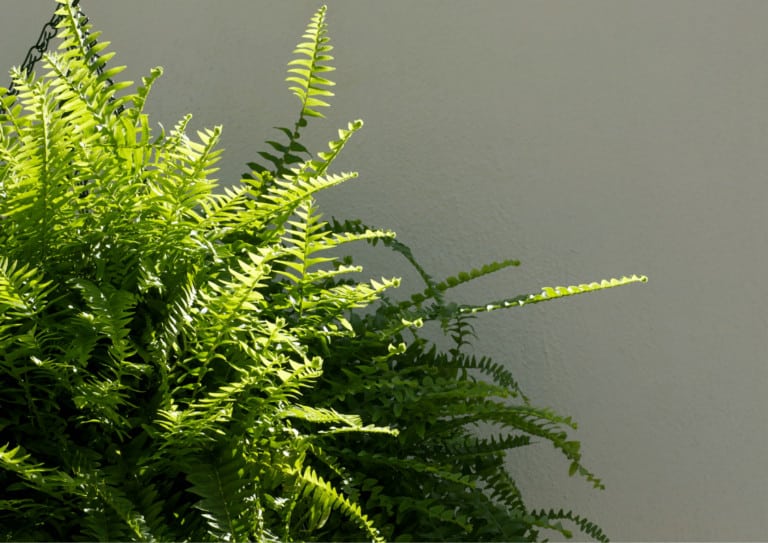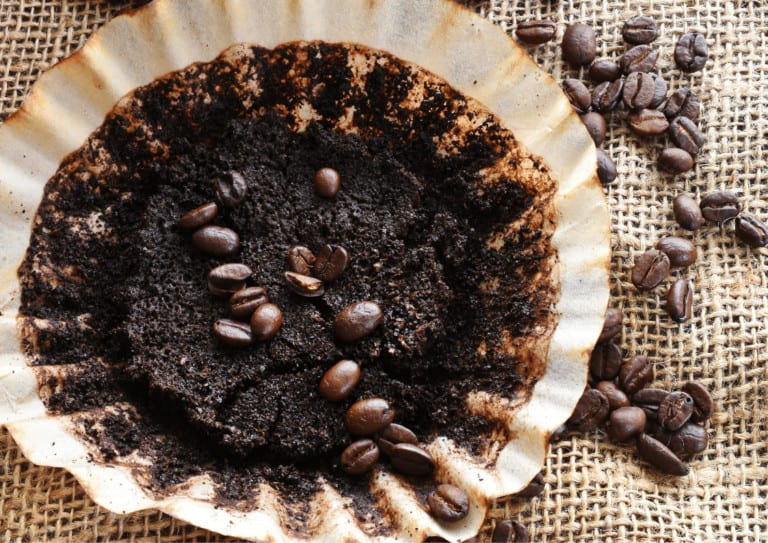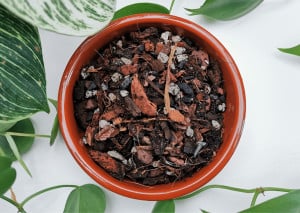Brewing Up Success: Using Coffee Grounds to Boost Your Boston Fern
- Lakeisha Ethans
- May 14, 2022
If you buy something using the retail links in our articles, sometimes we earn a small affiliate commission. This does not impact the products we recommend.
Coffee grounds are a common addition to many home gardeners’ repertoire. Suitable as soil additives, fertilizers, and anti-pest aids, they’re known to be great for many plants. But not all plants enjoy these grounds, and some may even be harmed by them.
So, how does the Boston Fern react to coffee grounds? With a reputation for being somewhat finicky as indoor plants, it’s tough to determine whether these ferns will enjoy coffee grounds as a part of their care.
Boston Ferns do like coffee grounds, but only in moderation. Used grounds provide nutrition in the from of nitrogen, magnesium and sugars to the plant whilst supporting beneficial micro-organisms in the soil. Too high a percentage of coffee grounds in your growing medium however can create a compact clay like texture which restricts root growth.
You’ll find that this is a somewhat controversial topic in the plant-growing world. Many plant-owners swear by coffee grounds for their ferns, but some professionals highly advise against it. As such, it really depends on your skill level and your plant’s needs.
In this article, we’ll laid out the arguments presented by both sides by answering the following questions:
- What are the benefits of coffee grounds for Boston Ferns?
- What are the dangers of using coffee grounds for Boston Ferns?
- How can I use coffee grounds for my Boston Ferns?
This post seeks to give you a better understanding of the right, safe way to use coffee grounds and how much your Boston Ferns can benefit from them.

What are the benefits of coffee grounds for Boston Ferns?
The biggest benefit of giving coffee grounds to Boston Ferns lies in coffee’s nitrogen content. Plants that are deficient in nitrogen have trouble pushing out new growth. It’s not uncommon for indoor plants to struggle with nitrogen deficiency. You may notice an immediate change in your Boston Ferns when you add coffee grounds to their soil because of the nitrogen boost!
Coffee grounds have about 2% nitrogen, which serves as a great nutrient for plants while giving helpful microorganisms a source of food. Coffee grounds also add a variety of other nutrients to the soil, especially when used as a part of a larger compost pile, which creates an enriching growth environment. These nutrients include sugar, magnesium, copper, and calcium.
Coffee grounds are also a great method for managing the moisture in a plant’s soil. Coffee grounds stick together when they’re wet because of the small size of their particles, so they’re able to boost water retention in soil that needs it.
Coffee grounds can also help with drainage, as contradictory as it sounds! All organic material works well in helping the soil to drain more easily, as they break up tightly packed soil. Properly spread-out coffee grounds will provide the right balance of drainage and retention for a Boston Fern.
When used correctly, coffee grounds can fight various forms of pathogenic fungi, like Sclerotinia and Fusarium. They can also fight bacteria like Staphylococcus and E. coli. This happens because the species of fungi and bacteria that breed on decomposing grounds are not harmful to ferns but still prevent the establishment of other harmful microorganisms.
Some plant-owners claim that coffee grounds can deter pests. They note that their plants are infested by fewer snails, slugs, and aphids when coffee grounds are used. However, this has not been proven scientifically, so keep that in mind if you’re tempted to try using grounds to keep pests at bay.

What are the dangers of using coffee grounds for Boston Ferns?
Coffee grounds are made up of small particles that clump together easily. When used in excess and packed too tightly together, they can form a clay-like soil texture that is terrible for Boston Ferns. This is why coffee grounds should be distributed sparsely and in small quantities to prevent water retention that leads to clumping.
The caffeine present in coffee grounds can also cause reduced growth when used in excess. Roots and leaves may be unable to develop, becoming stunted. This is why you should never use coffee grounds for young plants and seedlings. Only use them on mature Boston Ferns!
Finally, the benefits of coffee grounds may become harmful in excess. The ability of the grounds to fight bacteria may become overdone, thus killing even good bacteria that your plant needs. Coffee grounds can also accidentally promote fungal growth when too much of it is used, which can harm your plant.
Due to these dangers, it’s a good idea to go slow and steady when introducing coffee grounds to your Boston Ferns. Check your plants regularly to see how they’re reacting to the coffee and stop if you notice any negative results. Excessive use of most organic products will have a bad effect on plants, and coffee grounds are no exception, so use them moderately.

How can I use coffee grounds for my Boston Ferns?
An easy way to use coffee grounds for Boston Ferns is by using them as organic fertilizer. Use this about once a month as a supplement for other important fertilizers for best results. Don’t use it more often than that! You may also want to stop using grounds as fertilizer during slow-growth phases, such as during winter.
To make liquid fertilizer with coffee grounds for your Boston Ferns, start by boiling some water, then allow the water to cool. Put your coffee grounds in the water and set it aside. Leave the mixture for one or two weeks, stirring it every few days, until the grounds have broken down. Once ready, strain the liquid and use it as fertilizer.
Composting is another common way that coffee grounds are used for plant care. When you’re done with your coffee, simply add the grounds into your compost bin, as you do with other food waste. The nitrogen content of the grounds will assist in breaking down other items in your compost pile.
However, do note that your compost shouldn’t be overwhelmed by coffee grounds. Only up to a maximum of 20% of your total heap should involve coffee. Any more will harm your compost’s effectiveness and work against you.
Compost tea is another popular application method of coffee grounds for plants. This is an ideal method for people who don’t have a compost bin. Fill a big glass jar to about a quarter with used grounds, then fill the jar up the rest of the way with water. Place the jar in a warm location away from direct sunlight for a minimum of two weeks.
After the two weeks – but preferably for longer – your coffee compost tea is ready. Add one cup of its liquid for each half-gallon of water that you use in watering your Boston Fern. You can strain the tea first if your choose, but it’s not necessary. You can also continue to reuse the same grounds for future compost tea, as long as you top up the grounds with fresher ones as you go.
For a very easy way to use coffee grounds, take a few used grounds and sprinkle them sparsely over your Boston Fern’s soil. Then, water your plant as normal. The water will help to flush the coffee grounds down into the soil, easily infusing it. You should limit this application to one or two teaspoons of grounds once a month.
You can also opt to mix coffee grounds with mulch for your Boston Ferns. This process is a little tricky and has to be done carefully to avoid harming your plant. To do this safely, mix a quarter-inch of coffee grounds as a layer to mix with other organic materials for your mulch. Any thicker, and water and air won’t be able to pass through! The coffee grounds must be distributed evenly, not clumped, to prevent further aeration issues.
Finally, if you’re repotting your Boston Fern, you can add some coffee grounds to the potting mix. Add one or two handfuls of grounds to the mix and combine thoroughly to add nutrients and repel diseases. Just be sure not to use too much!
Take home message
Coffee grounds are a suitable addition to a care routine for Boston Ferns and have been observed to encourage the plant to propagate using stolons, but they have to be used in careful moderation. Excessive use can kill good bacteria, promote fungal growth, and lead to water retention and inhibited growth.
But, when used well, coffee grounds are capable of providing much-needed nutrients to Boston Ferns while keeping them safe from bad bacteria and improving moisture balance in the soil. Their nitrogen content makes them ideal for Boston Ferns!
You can use coffee grounds for Boston Ferns by turning them into liquid fertilizer, adding them to your compost pile, or making compost tea. You can also simply use them sparingly as mulch or repotting soil!

Lakeisha Ethans
Houseplant Writer
Mother to two humans and hundreds of plant babies. Lakeisha uses her 15 years of experience as a content writer to specialise in simplifying what you need to know to grow and care for all indoor plants.
Similar Posts
The Best Soil Mix For Philodendron Xanadu (Soil Recipe)
The perfect soil mix for Philodendron xanadu provides water retention, aeration and nutrition. We explore what ingredients provides these qualities best.
Are Orange Peels Good For Houseplants?
Adding organic matter to houseplant soil usually isn't a bad idea. But what about orange peel? Is this citrus rind too acidic to be good for houseplants?



